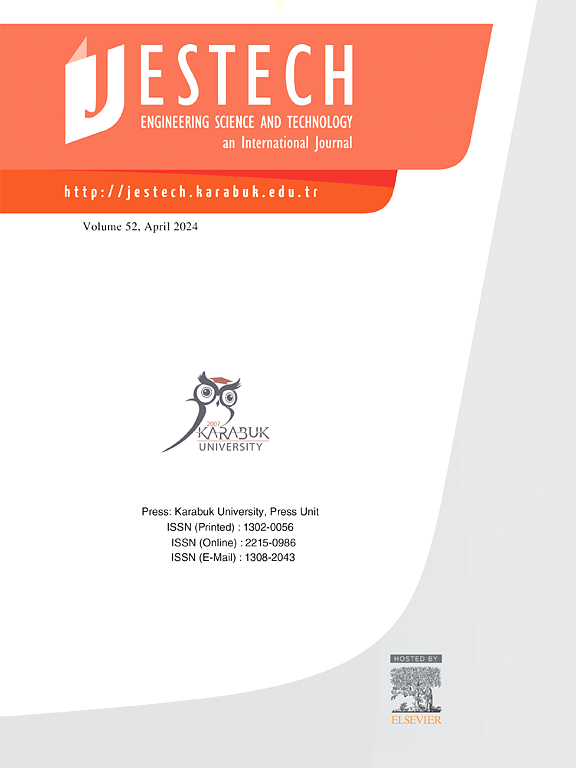High-gain adaptive observer for floating voltages estimation and capacitor aging monitoring in multicell converters
IF 5.1
2区 工程技术
Q1 ENGINEERING, MULTIDISCIPLINARY
Engineering Science and Technology-An International Journal-Jestech
Pub Date : 2025-04-04
DOI:10.1016/j.jestch.2025.102036
引用次数: 0
Abstract
In multicell converters, capacitors play a critical role in energy management and voltage stabilization of each cell. They ensure balanced regulation of floating voltages and minimize energy losses during switch commutations. However, capacitor aging leads to increased dielectric losses, equivalent series resistance (ESR), and energy dissipation, which degrade the performance of the converter and increase the risk of failure. Consequently, effective monitoring of capacitor aging is essential. Moreover, in such converters, estimating the voltages across flying capacitors is crucial for the synthesis of most control laws. To address these dual issues, this paper proposes a high-gain adaptive observer capable of simultaneously estimating the parameters and state variables of multicell converters. This approach enables real-time monitoring of capacitor aging while estimating floating voltages. Novel hybrid dynamic models of the converter are introduced, incorporating equivalent series resistance and equivalent capacitance as parameters to be estimated to account for capacitor aging. The observer is designed to estimate the voltages of flying capacitors, the load resistance, and the dielectric loss resistance due to aging. Its design relies on a thorough analysis of the observability of states and parameters, which depends on the discrete states of the converter, and its stability is demonstrated using the Lyapunov approach. Numerical simulations performed on a three-cell converter demonstrate the effectiveness of the proposed observer in estimating the voltages of flying capacitors and simultaneously monitoring their health.
求助全文
约1分钟内获得全文
求助全文
来源期刊

Engineering Science and Technology-An International Journal-Jestech
Materials Science-Electronic, Optical and Magnetic Materials
CiteScore
11.20
自引率
3.50%
发文量
153
审稿时长
22 days
期刊介绍:
Engineering Science and Technology, an International Journal (JESTECH) (formerly Technology), a peer-reviewed quarterly engineering journal, publishes both theoretical and experimental high quality papers of permanent interest, not previously published in journals, in the field of engineering and applied science which aims to promote the theory and practice of technology and engineering. In addition to peer-reviewed original research papers, the Editorial Board welcomes original research reports, state-of-the-art reviews and communications in the broadly defined field of engineering science and technology.
The scope of JESTECH includes a wide spectrum of subjects including:
-Electrical/Electronics and Computer Engineering (Biomedical Engineering and Instrumentation; Coding, Cryptography, and Information Protection; Communications, Networks, Mobile Computing and Distributed Systems; Compilers and Operating Systems; Computer Architecture, Parallel Processing, and Dependability; Computer Vision and Robotics; Control Theory; Electromagnetic Waves, Microwave Techniques and Antennas; Embedded Systems; Integrated Circuits, VLSI Design, Testing, and CAD; Microelectromechanical Systems; Microelectronics, and Electronic Devices and Circuits; Power, Energy and Energy Conversion Systems; Signal, Image, and Speech Processing)
-Mechanical and Civil Engineering (Automotive Technologies; Biomechanics; Construction Materials; Design and Manufacturing; Dynamics and Control; Energy Generation, Utilization, Conversion, and Storage; Fluid Mechanics and Hydraulics; Heat and Mass Transfer; Micro-Nano Sciences; Renewable and Sustainable Energy Technologies; Robotics and Mechatronics; Solid Mechanics and Structure; Thermal Sciences)
-Metallurgical and Materials Engineering (Advanced Materials Science; Biomaterials; Ceramic and Inorgnanic Materials; Electronic-Magnetic Materials; Energy and Environment; Materials Characterizastion; Metallurgy; Polymers and Nanocomposites)
 求助内容:
求助内容: 应助结果提醒方式:
应助结果提醒方式:


